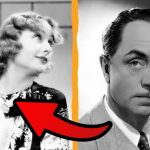Joseph Cotten was a film, stage, and television actor that arguably remains best known to the public for his role in Orson Welles’ classic Citizen Kane. Several decades later, Joseph Cotten lost his voice and was forced to retire from acting in the years leading up to his death. Join Facts Verse as we explore how Joseph Cotten lost this voice completely in his final days.
Joseph Cotten’s Early Life
Joseph Cotten was born on the 15th of May, 1905, in Petersburg, Virginia. Joseph grew up in a middle-class family and had two older brothers, with their names being Whit and Sam. Joseph’s comfortable upbringing allowed the boy to explore his creative interests starting at a young age. He became interested in acting when he was attending high school, and this led to him attending the Robert Hickman School of Speech and Expression after his high-school education.
While attending the Robert Hickman School of Speech and Expression, Joseph managed to support himself financially by working part-time as a salesman. During this time period, Joseph could also be found playing football. The young man had grown into quite the physical specimen, and his height would help him get roles when he came out to Hollywood.
Joseph Cotten wandered America for much of his early 20s, continuing to work part-time as a salesman while searching for acting gigs in locations such as Washington and Miami. In Miami, he became a theater critic for the local Miami Herald, and also started up a gig working as an actor at the Miami Civic Theater. Joseph worked at the Miami Civic Theater for a total of five years before deciding to say goodbye to Miami and head out to Boston. Joseph arrived in Boston in the late 1920s, and continued performing on the stage by taking on acting gigs at the nearby Copley Theatre.
Joseph Worked for Years on the Stage
Joseph Cotten had accumulated quite a bit of acting experience over the course of his early career. The burgeoning star was able to get even more experience in 1930, when he moved out to New York City and began working as an assistant stage manager. Over the course of the early 1930s, Joseph would go on to become a fairly notable performer on Broadway, with the actor taking on roles in productions such as Absent Father and Jezebel.
Joseph’s career in the entertainment industry was slowly but surely coming to fruition, though Joseph became temporarily distracted from his dreams of stardom when he met the woman that was to become his first wife. Joseph married first wife Lenore Kipp LaMont in 1931, and they remained married until 1960. Soon after the wedding, Joseph and Lenore were wanting for money. Because of this, Joseph took up some extra work on the radio. It was during his radio days that Joseph first met Orson Welles.
Orson Welles was working in radio at the same time that Joseph Cotten was, though Orson Welles was around ten years Joseph’s junior. The two developed an incredibly close friendship, and Orson would begin directing Joseph in a number of plays. After putting on a few productions together, Orson Welles opened up the Mercury Theatre. Joseph then joined the director’s official theatre troupe, and appeared in multiple productions under the director during this time.
Joseph Cotten’s Friendship with Orson Welles
By the end of the 1930s, Joseph Cotten and Orson Welles had found a great deal of success with their productions at the Mercury Theatre. This success allowed Orson the chance to sign a contract with RKO Pictures that gave him an unprecedented amount of creative control over his movies. This is what paved the way for Orson Welles to create his masterpiece Citizen Kane. When it came time for Orson Welles to start creating pictures, he carried over the cast that he had accumulated while putting on plays at the Mercury Theatre. This included Joseph Cotten, who found himself playing a major supporting role in the picture.
Before appearing in 1941’s Citizen Kane, Joseph Cotten received a great deal of critical acclaim when he portrayed the male lead in the Broadway production of The Philadelphia Story. Joseph’s role in the play saw him starring alongside notable actress Katharine Hepburn. Sadly, Joseph wasn’t given the chance to reprise his role for the play’s Hollywood adaptation, as he hadn’t yet proven himself as a Hollywood star. Instead, Joseph’s role in The Philadelphia Story was taken over by Cary Grant for the 1941 film adaptation. Still, Joseph’s performance in Citizen Kane that same year proved that he had what it took to make it on the screen. If you’re enjoying this video so far, be sure to hit the like button to show your support! Also, subscribe to the channel if you’d like to be among the first to know when more Facts Verse videos are on their way!
Joseph’s Work After Citizen Kane
Citizen Kane was a major critical success, and many still consider it to be one of the best films ever made. The film may be the most memorable film that Joseph Cotten ever starred in, but it’s certainly not the only memorable feature starring the actor. In the film, Joseph played the role of Jebediah Leland. Like Joseph had been previously during his days in Miami, the character of Jebediah was a drama critic. Joseph’s character was a good friend of the film’s titular character, who was played by Orson Welles.
Following Joseph’s breakout performance in Citizen Kane, the actor went on to appear in the 1942 picture The Magnificent Ambersons. This gig cemented Joseph’s status as a star to look out for on the big screen. Joseph then got the chance to work with director Alfred Hitchcock in 1943, with the actor appearing in the legendary filmmaker’s classic Shadow of a Doubt. The same year, Joseph also appeared alongside Deanna Durbin in Hers to Hold.
Joseph’s work alongside Deanna Durbin in Hers to Hold proved that the actor had what it took to be a romantic interest on the screen. The next year, Joseph got to play the love interests of both Claudette Colbert and Ginger Rogers. Joseph wooed Claudette in the film Since You Went Away, while he charmed Ginger in the film I’ll Be Seeing You. Both of these films were released in 1944, and they further increased Joseph’s rapidly growing cinematic profile.
The 1940s Was Joseph’s Biggest Decade
Joseph Cotten starred in many more notable pictures over the course of the ensuing 1940s, with just a few examples including Duel in the Sun and The Farmer’s Daughter. Duel in the Sun costarred Gregory Peck, while The Farmer’s Daughter netted an Academy Award for costar Loretta Young. At the end of the decade, Joseph worked with his old friend Orson Welles again in the classic film The Third Man. The film was released in 1949, and made it so that Joseph exited the 1940s with a bang. Sadly, Joseph’s career prospects started going downhill after the decade was over, and he never again reached the heights of The Third Man.
Joseph had been a mere supporting player in Citizen Kane, but Orson Welles cast him as the lead in The Third Man. While Citizen Kane is undeniably Joseph’s most well known film in general, his role in The Third Man is undeniably his most iconic leading turn. Over the course of the 1940s, Joseph wouldn’t find anywhere near the same level of success on the screen that he had found in the 1930s. This came in spite of the fact that he continued working with prestigious talent, including Bette Davis. Joseph appeared alongside Bette Davis in the 1949 film Beyond the Forest, which is widely considered to be one of the actress’s worst films. That same year, Joseph also got the chance to work with Alfred Hitchcock again on the film Under Capricorn. As with Bette Davis and Beyond the Forest, Beyond Capricorn is generally regarded to be one of Alfred’s least-loved films. The poor reception of these films had little to do with Joseph Cotten himself, but it certainly impacted his career.
The 1950s proved even less successful for Joseph Cotten than the 1940s had, with the actor continuing to lend his talents to dismal films. A bright spot during this decade came via the actor’s performance in the film Niagara, which also happened to star newcomer Marilyn Monroe early on in the bombshell’s career. While Joseph didn’t find much success on the big screen during the 1950s, the small screen was another story. Joseph began appearing more and more on television dramas, with the actor being a favorite on anthology productions like Celebrity Playhouse, The Ford Television Theater, and General Electric Theater.
Joseph Cotten’s Tragic End
During the mid-1960s, Joseph Cotten worked with Bette Davis yet again on the horror film Hush…Hush, Sweet Charlotte. Following this appearance, Joseph only appeared in a few film before his 1994 death. Those films included the war film Tora! Tora! Tora!, as well as the 1977 blockbuster disaster film Airport ’77. Tragically, Joseph was forced to give up acting altogether towards the end of his life as a result of medical issues. Around a decade before his 1994 death, Joseph Cotten lost his voice entirely as a result of a laryngenectomy. Despite the fact that Joseph met a tragic end, he lived a long and fulfilling life of 88 years leading up to it and will always be remembered for his work.
Joseph Cotten was married two times over the course of his lifetime. We’ve already mentioned Joseph’s first wife, who he remained married to until 1960. Joseph’s first marriage ended as a result of his wife’s passing. His first wife was a pianist, and she died of leukemia. After her passing, Joseph admitted that he had been unfaithful to his first wife numerous times. Joseph then remarried to an actress by the name of Patricia Medina the same year of his first wife’s passing. The two remained married until Joseph’s death.
Despite his tragic end, Joseph Cotten will always be fondly remembered for his work in the handful of classic films that he appeared in. Now it’s time to hear from you: did you know that Joseph Cotten was a good friend of Orson Welles’, and that the actor was forced into retirement after losing his voice? As always, like this video to show your support, and subscribe and hit the notification bell if you’d like to be among the first to know when more Facts Verse videos are on their way!


